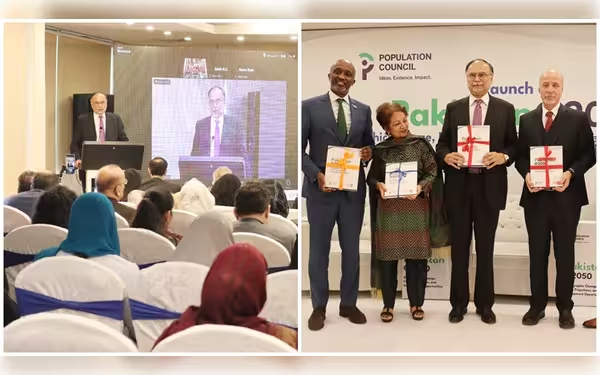Saturday, November 16, 2024 08:55 PM
Planning Minister Ahsan Iqbal Stresses Policy Continuity for Economic Growth
- Policy stability is crucial for economic growth.
- UNFPA study outlines future demographic challenges.
- Long-term vision needed for sustainable development.
 Image Credits: radio.gov.pk
Image Credits: radio.gov.pkPlanning Minister Ahsan Iqbal emphasizes the need for stable policies to ensure Pakistan's economic growth and address future challenges.
In recent discussions surrounding Pakistan's economic future, the importance of stable and continuous policies has emerged as a critical theme. The Planning Minister, Ahsan Iqbal, emphasized this point during a ceremony held in Islamabad, where he addressed the launch of the study titled "Pakistan at 2050" by the United Nations Population Fund (UNFPA) and the Population Council. This study aims to provide insights into the demographic and economic challenges that Pakistan may face in the coming decades.
During his address, Minister Iqbal articulated that the key to overcoming the obstacles hindering economic growth lies in the "stability and continuity of policies." He argued that without a consistent approach to governance and economic management, the country would struggle to achieve its growth potential. This statement resonates with many experts who believe that a predictable policy environment is essential for attracting investment and fostering economic development.
The study "Pakistan at 2050" highlights various factors that will influence the nation’s trajectory, including population growth, urbanization, and economic trends. As Pakistan's population continues to rise, the need for effective policies that address education, healthcare, and employment becomes increasingly urgent. Minister Iqbal's remarks underscore the necessity for a long-term vision that can guide the country through these challenges.
Moreover, the Planning Minister's call for policy continuity is particularly relevant in a political landscape often marked by frequent changes in leadership and direction. Investors and businesses thrive in environments where they can predict future conditions, and a commitment to stable policies can help build that trust. It is crucial for the government to prioritize this stability to ensure sustainable economic growth.
As Pakistan navigates its path toward 2050, the insights from the UNFPA study and the emphasis on policy continuity by Minister Ahsan Iqbal serve as a reminder of the importance of strategic planning. By focusing on stability and long-term goals, Pakistan can better position itself to tackle the challenges ahead and harness the opportunities that come with a growing population and evolving economy. The future of Pakistan depends on the decisions made today, and a commitment to consistent policies will be vital in shaping a prosperous tomorrow.













